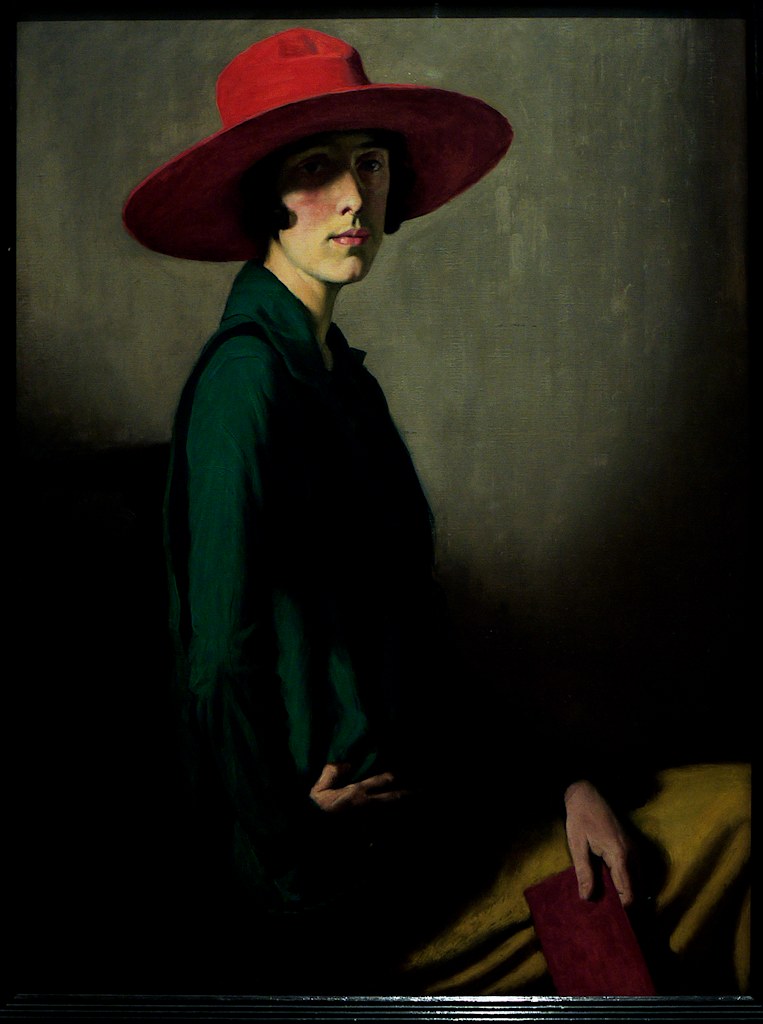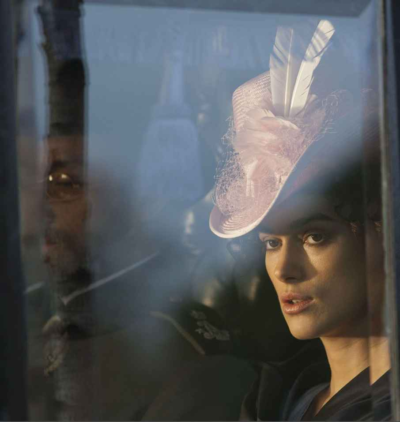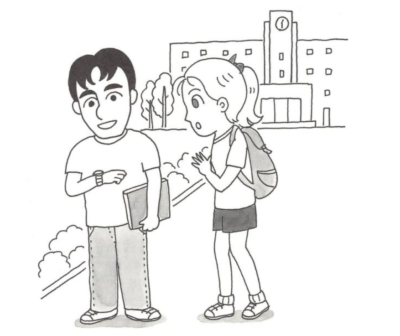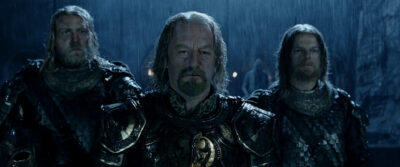This post is a draft. I’m showing you a messy draft post to give you some ideas about how you might approach this next assignment. This is in part because I don’t have time to revise this into a more polished state, but also because I want you all to see a path to getting started on posts that will feature lots of direct quotation and highlight new discoveries you’re able to make as you revise (you have lots of time to revise on this assignment because of spring break). I’m asking you to do an extra step that we haven’t done before with this third assignment, and so this draft post also contains a structure that you can use as a template (if you find that useful!).
Ways of Thinking about Character
Here are some things I found really useful when I read H. Porter Abbott’s chapter, “Character and Self in Narrative,” from the Cambridge Introduction to Narrative. Abbott explains that “ever since the distinction between character and action in narrative was first introduced over two thousand years ago, theorists have tended to give priority of importance to one or the other” (136). He explains that Aristotle thought of the actions as most important (writers create characters for “the sake of the action”), but others thought character was more important. He notes that Henry James thought of character and action as inextricably linked, quoting James as saying
What is character but the determination of incident? What is incident by the illustration of character?…It is an incident for a woman to stand up with her hand resting on a table and look out at you in a certain way; or if it be not an incident I think it will be hard to say what it is. At the same it is an expression of character.
-Henry James, qtd in Abbott 137
Abbott also points out that character is hard to understand and gives a fantastic example:
“please, he implored, “give me one more chance!”
Suddenly she felt a headache coming on.
“The action here is: A (his pleading) > B (her headache). But when we ask why his pleading should lead to her headache, then we are asking what kind of characters we have here whose combined agency should make this cause and effect sequence possible […]. Does the headache arise out of guilt? Does she feel (irrationally perhaps) that she is a cold, unsympathetic woman who should care more for this poor guy? Or is she furious at what she sees as an attempt to manipulate her, and does the headache come about because she can’t express her anger? Or does she love him passionately, and does the headache come from the effort not to collaborate with his weakness? Or is this a headache of despair […]. Probably most of us reading through this passage do not probe this far at the time we read it but read on with the assumption that her character will gradually become clearer. Or perhaps her character is already clear enough for us to have a precise idea of what’s going through her mind. But it may eventually turn out that an interpretation of the narrative stands or falls on how we fill this gap.”
-Abbott 139
Abbott moves on to consider whether characters can be real (or if they’re only marks on a page that prompt us to imagine a representation of that character in our minds), and ultimately argues that, no matter how carefully they are presented by an author, “no character can match the complexity and changeableness of people as they really are” (142). “All characterization,” says Abbott, “involves some degree of flattening” (142). And this helps us understand the role “types” in narrative.
All cultures and subcultures include numerous types that circulate through all the various narrative modes: the hypocrite, the flirt, the evil child, the Pollyanna, the strong mother, the stern father, the cheat, the shrew, the good Samaritan, the wimp, the nerd, the vixen, the stud, the schlemiel, the prostitute with a heart of gold, the guy with a chip on his shoulder, the orphan, the yuppie, the Uncle Tom, the rebel.
-Abbott 142
And Abbott rightly points out that “compressing people into types denies them their full humanity,” and that there are terrible consequences of “branding (the word is apt) human beings as types” (142). But then he asks, “are human beings capable of characterizing without the use of types? Do we know how to think of people in a type-free way?” (142). Ultimately, he offers no examples of this being accomplished.
It may be that characterization and thinking in types is part of our mental equipment, and it may also be that the rick complexity and constantly changing nature of human beings can never be adequately captured by this narrative equipment. But this is not the same as saying that character is inevitably deceptive and that narrative can only deal in illusions because of this. It is true that character in purportedly non-fiction narrative can be false, misleading, unfair, and slanderous.
-Abbott 143
Ultimately, though, I think Abbott is right to emphasize that “Characterization by type can accommodate a great deal of human complexity. If one looks at the narratives of Shakespeare, Tolstoy, Chaucer, and George Eliot, one sees that the central figures can all be referred to by some dominating type […] but these characters are rarely simply types but rather the syntheses of types” (144).
Homer’s Achilles in The Illiad may be the type of the military hero, but he is also a compound of the professional soldier, the stubborn man, the prima donna, the passionate man, and the devoted friend
-Abbott 144
The New Thing I’m Reading
I’m going to pretend that I’ve never read Virginia Woolf’s Orlando before and include passages that I noted when I listened to it on Librivox this summer (none of you are allowed to do this…you have to pick something genuinely new. I just really want to tell you all about Orlando).
The very first lines of the first chapter (set in the 15th century)
He–for there could be no doubt of his sex, though the fashion of the time did something to disguise it–was in the act of slicing at the head of a Moor which swung from the rafters. It was the colour of an old football, and more or less the shape of one, save for the sunken cheeks and a strand or two of coarse, dry hair, like the hair on a cocoanut. Orlando’s father, or perhaps his grandfather, had struck it from the shoulders of a vast Pagan who had started up under the moon in the barbarian fields of Africa; and now it swung, gently, perpetually, in the breeze which never ceased blowing through the attic rooms of the gigantic house of the lord who had slain him.
-Orlando 13
The very first lines of chapter two, indicating that time has passed and Orlando has also changed
The biographer is now faced with a difficulty which it is better perhaps to confess than to gloss over. Up to this point in telling the story of Orlando’s life, documents, both private and historical, have made it possible to fulfil the first duty of a biographer, which is to plod, without looking to right or left, in the indelible footprints of truth; unenticed by flowers; regardless of shade; on and on methodically till we fall plump into the grave and write finis on the tombstone above our heads. But now we come to an episode which lies right across our path, so that there is no ignoring it. Yet it is dark, mysterious, and undocumented; so that there is no explaining it. Volumes might be written in interpretation of it; whole religious systems founded upon the signification of it. Our simple duty is to state the facts as far as they are known, and so let the reader make of them what he may.
In the summer of that disastrous winter which saw the frost, the flood, the deaths of many thousands, and the complete downfall of Orlando’s hopes–for he was exiled from Court; in deep disgrace with the most powerful nobles of his time; the Irish house of Desmond was justly enraged; the King had already trouble enough with the Irish not to relish this further addition–in that summer Orlando retired to his great house in the country and there lived in complete solitude. One June morning–it was Saturday the 18th–he failed to rise at his usual hour, and when his groom went to call him he was found fast asleep. Nor could he be awakened. He lay as if in a trance, without perceptible breathing; and though dogs were set to bark under his window; cymbals, drums, bones beaten perpetually in his room; a gorse bush put under his pillow; and mustard plasters applied to his feet, still he did not wake, take food, or show any sign of life for seven whole days. On the seventh day he woke at his usual time (a quarter before eight, precisely) and turned the whole posse of caterwauling wives and village soothsayers out of his room, which was natural enough; but what was strange was that he showed no consciousness of any such trance, but dressed himself and sent for his horse as if he had woken from a single night’s slumber. Yet some change, it was suspected, must have taken place in the chambers of his brain, for though he was perfectly rational and seemed graver and more sedate in his ways than before, he appeared to have an imperfect recollection of his past life. He would listen when people spoke of the great frost or the skating or the carnival, but he never gave any sign, except by passing his hand across his brow as if to wipe away some cloud, of having witnessed them himself. When the events of the past six months were discussed, he seemed not so much distressed as puzzled, as if he were troubled by confused memories of some time long gone or were trying to recall stories told him by another. It was observed that if Russia was mentioned or Princesses or ships, he would fall into a gloom of an uneasy kind and get up and look out of the window or call one of the dogs to him, or take a knife and carve a piece of cedar wood. But the doctors were hardly wiser then than they are now, and after prescribing rest and exercise, starvation and nourishment, society and solitude, that he should lie in bed all day and ride forty miles between lunch and dinner, together with the usual sedatives and irritants, diversified, as the fancy took them, with possets of newt’s slobber on rising, and draughts of peacock’s gall on going to bed, they left him to himself, and gave it as their opinion that he had been asleep for a week.
-Orlando 65-6
And then, a little way into chapter 3, Orlando sleeps again and awakes as a woman
at which Orlando woke.
He stretched himself. He rose. He stood upright in complete nakedness before us, and while the trumpets pealed Truth! Truth! Truth! we have no choice left but confess–he was a woman.
***
The sound of the trumpets died away and Orlando stood stark naked. No human being, since the world began, has ever looked more ravishing. His form combined in one the strength of a man and a woman’s grace. As he stood there, the silver trumpets prolonged their note, as if reluctant to leave the lovely sight which their blast had called forth; and Chastity, Purity, and Modesty, inspired, no doubt, by Curiosity, peeped in at the door and threw a garment like a towel at the naked form which, unfortunately, fell short by several inches. Orlando looked himself up and down in a long looking-glass, without showing any signs of discomposure, and went, presumably, to his bath.
We may take advantage of this pause in the narrative to make certain statements. Orlando had become a woman–there is no denying it. But in every other respect, Orlando remained precisely as he had been. The change of sex, though it altered their future, did nothing whatever to alter their identity. Their faces remained, as their portraits prove, practically the same. His memory–but in future we must, for convention’s sake, say ‘her’ for ‘his,’ and ‘she’ for ‘he’–her memory then, went back through all the events of her past life without encountering any obstacle. Some slight haziness there may have been, as if a few dark drops had fallen into the clear pool of memory; certain things had become a little dimmed; but that was all. The change seemed to have been accomplished painlessly and completely and in such a way that Orlando herself showed no surprise at it. Many people, taking this into account, and holding that such a change of sex is against nature, have been at great pains to prove (1) that Orlando had always been a woman, (2) that Orlando is at this moment a man. Let biologists and psychologists determine. It is enough for us to state the simple fact; Orlando was a man till the age of thirty; when he became a woman and has remained so ever since.
-Orlando 137-8
I’ll stop here in grabbing quotations becuase I think this will give me enough to talk about, though actually in chapter four there are great moments when Orlando realizes how being perceived by others as a woman is when real changes actually start to happen. I’m putting the passages here for now and will just say that I recall responding to the conceit of this novel as wonderful when I read it for the first time. The idea that you could imagine how the same person would behave in different periods and with a different sex was such a tremendously exciting thought experiment. I never felt truly connected to the emotions of Orlando (the narrator gives us a lot of ironic distance), but I did imagine myself experiencing those same changes and wondering how that would work.
A Brilliant Character
For a long time, I thought that I was going to be talking about Molly Bloom in this section, but I’ve realized recently that the character I’m most interested in is her husband, Leopold Bloom. He’s the one who introduces the allusion that helps me understand his character in relation to her character.
All I’m going to say right now is that I had grand plans to turn this paper I wrote in graduate school (about an allusion to Mozart’s Don Giovanni in James Joyce’s Ulysses) into a video essay. Maybe I’ll still do it before this assignment is done? For now, though, you can see my paper if you want to understand how the allusion to Don Giovanni helps shape the characters of Molly and Leopold Bloom, the married couple at the center of Ulysses. Molly is performing an aria from the opera (not the full opera) in an upcoming performance and she is also hiding an affair from her husband (the affair is with the man arranging the performance). Leopold knows that he is hiding this affair and he imagines her singing the aria (which depicts a wealthy libertine luring a young peasant woman away from her peasant fiance) and changing the lines.
I want my video essay to feature lots of different performances of this aria, but here is a good introduction to the aria, setting up the scene (a version with Italian subtitles on the left, a version with English subtitles on the right)
SO MANY things to say about this opera and the portrayal of libertines and the women they seduce. Alluding to this opera is like alluding to a thousand different possibilities for power, sexuality, and seduction.
And here’s the scene in Ulysses when Leopold Bloom first thinks of Molly singing the aria
Nudging the door open with his knee he carried the tray in and set it on the chair by the bedhead.
—What a time you were! she said.
She set the brasses jingling as she raised herself briskly, an elbow on the pillow. He looked calmly down on her bulk and between her large soft bubs, sloping within her nightdress like a shegoat’s udder. The warmth of her couched body rose on the air, mingling with the fragrance of the tea she poured.
A strip of torn envelope peeped from under the dimpled pillow. In the act of going he stayed to straighten the bedspread.
—Who was the letter from? he asked.
Bold hand. Marion.
—O, Boylan, she said. He’s bringing the programme.
—What are you singing?
—Là ci darem with J. C. Doyle, she said, and Love’s Old Sweet Song.
Her full lips, drinking, smiled. Rather stale smell that incense leaves next day. Like foul flowerwater.
—Would you like the window open a little?
She doubled a slice of bread into her mouth, asking:
—What time is the funeral?
—Eleven, I think, he answered. I didn’t see the paper.
Following the pointing of her finger he took up a leg of her soiled drawers from the bed. No? Then, a twisted grey garter looped round a stocking: rumpled, shiny sole.
—No: that book.
Other stocking. Her petticoat.
—It must have fell down, she said.
He felt here and there. Voglio e non vorrei. Wonder if she pronounces that right: voglio. Not in the bed. Must have slid down. He stooped and lifted the valance. The book, fallen, sprawled against the bulge of the orangekeyed chamberpot.
—Show here, she said. I put a mark in it. There’s a word I wanted to ask you.
She swallowed a draught of tea from her cup held by nothandle and, having wiped her fingertips smartly on the blanket, began to search the text with the hairpin till she reached the word.
—Met him what? he asked.
—Here, she said. What does that mean?
He leaned downward and read near her polished thumbnail.
—Metempsychosis?
—Yes. Who’s he when he’s at home?
—Metempsychosis, he said, frowning. It’s Greek: from the Greek. That means the transmigration of souls.
—O, rocks! she said. Tell us in plain words.
-Ulysses 98-100
Creating a Character
So, my goal is to create a character by having a character notice that another character is doing something that they are hiding and imagine that other character’s motivations with an allusion to a completely different story. In Ulysses, the thing that Molly is doing is hiding an affair with Blazes Boylan (her manager), but Bloom knows what she’s doing. He delivers the letter to her, which she hides…and then he imagines the song that she’ll be singing and imagines her singing it differently than the actual lyrics. I actually sort of love this idea of misremembering or deliberately changing the lines of a song (I think what’s powerful about it in addition to a rich story with a long and complex history is the fact that the song is a bit of an earworm…you can imagine it getting stuck in your head). The first thing that comes to mind for me is Billie Eilish’s “Bad Guy,” so I’ll look at those lyrics to see if they inspire anything. But also…I’m remembering that there’s the song that always gets stuck in my head even though I don’t know the actual lyrics.
And then also…the allusion is specifically to an opera, not just a song. Sometimes songs communicate a full story, but maybe the better way to think about this is in terms of opera that is very well known today. Maybe something like a musical. And what musical is better known than any other? Hamilton. The song that always gets stuck in my head is this one…
Maybe the lines I can play with could be
You’ll be back
-Hamilton
soon you’ll see
you’ll remember you belong to me
Especially because the lyrics change each time he comes out.
But then, the song that more frequently gets stuck in my head these days is Jack Black as Bowser singing “Peaches”. Both of these songs have very clear stories associated with them so I think I can play with that.
And with this one, a funny thing I could do is play around with who peaches is and who the person is that is 1) Obsessed with someone who is not interested and 2) Extremely powerful and therefore capable of forcing that person to do things they don’t want to. My first thought is that the character could be obsessed with starting a vineyard and growing peach trees, but that’s silly. A funny meme probably already exists mapping Bowser’s song with the famous peach scene from Call Me By Your Name, so hmmmm. This is a draft. I will not solve it now.
If I were trying to do what Fletcher does, I don’t know that I’d be focusing so much on the function of the allusion as I would be on the emotion inspired by reading a husband know but not admit to himself that his wife is cheating on him. This idea of giving access to the thoughts of a character who is in denial about something (or not in denial, but also not acknowledging) is where the real emotional work is happening. I’m sharing this with all of you before I’ve written my character, but I’ll try to come back and actually draft something before we discuss as a class.
Works Cited
Abbott, H. Porter. The Cambridge Introduction to Narrative. Cambridge University Press, 2020.
James Joyce. Ulysses. 1922. Internet Archive, http://archive.org/details/ulysses2018.
Virginia Woolf. Orlando a Biography. 1928. Internet Archive, http://archive.org/details/orlandobiography0000virg.
Featured Image
“vita sackville west by william strang 1918” by tom clearwood is licensed under CC BY-NC-SA 2.0.




